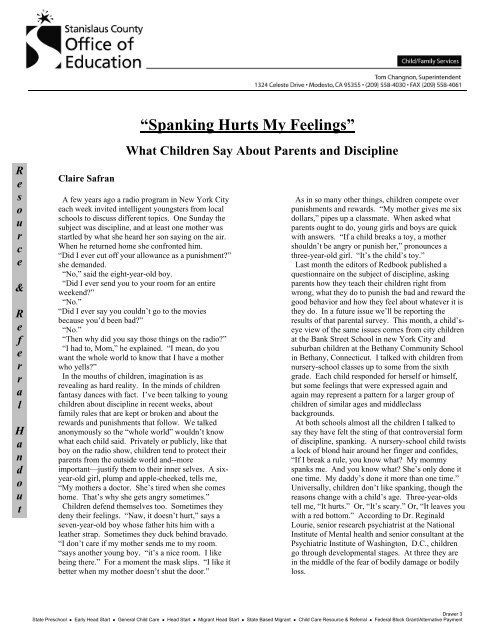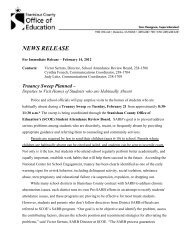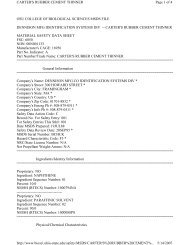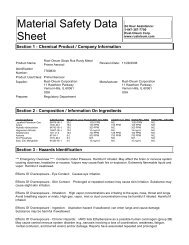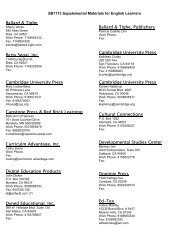Spanking Hurts My
Spanking Hurts My
Spanking Hurts My
You also want an ePaper? Increase the reach of your titles
YUMPU automatically turns print PDFs into web optimized ePapers that Google loves.
R<br />
e<br />
s<br />
o<br />
u<br />
r<br />
c<br />
e<br />
&<br />
R<br />
e<br />
f<br />
e<br />
r<br />
r<br />
a<br />
l<br />
H<br />
a<br />
n<br />
d<br />
o<br />
u<br />
t<br />
Article 39<br />
Claire Safran<br />
“SPANKING HURTS MY<br />
“<strong>Spanking</strong> <strong>Hurts</strong> <strong>My</strong> Feelings”<br />
What Children Say About Parents and Discipline<br />
A few years ago a radio program in New York City<br />
each week invited intelligent youngsters from local<br />
schools to discuss different topics. One Sunday the<br />
subject was discipline, and at least one mother was<br />
startled by what she heard her son saying on the air.<br />
When he returned home she confronted him.<br />
“Did I ever cut off your allowance as a punishment?”<br />
she demanded.<br />
“No,” said the eight-year-old boy.<br />
“Did I ever send you to your room for an entire<br />
weekend?”<br />
“No.”<br />
“Did I ever say you couldn’t go to the movies<br />
because you’d been bad?”<br />
“No.”<br />
“Then why did you say those things on the radio?”<br />
“I had to, Mom,” he explained. “I mean, do you<br />
want the whole world to know that I have a mother<br />
who yells?”<br />
In the mouths of children, imagination is as<br />
revealing as hard reality. In the minds of children<br />
fantasy dances with fact. I’ve been talking to young<br />
children about discipline in recent weeks, about<br />
family rules that are kept or broken and about the<br />
rewards and punishments that follow. We talked<br />
anonymously so the “whole world” wouldn’t know<br />
what each child said. Privately or publicly, like that<br />
boy on the radio show, children tend to protect their<br />
parents from the outside world and--more<br />
important—justify them to their inner selves. A sixyear-old<br />
girl, plump and apple-cheeked, tells me,<br />
“<strong>My</strong> mothers a doctor. She’s tired when she comes<br />
home. That’s why she gets angry sometimes.”<br />
Children defend themselves too. Sometimes they<br />
deny their feelings. “Naw, it doesn’t hurt,” says a<br />
seven-year-old boy whose father hits him with a<br />
leather strap. Sometimes they duck behind bravado.<br />
“I don’t care if my mother sends me to my room.<br />
“says another young boy. “it’s a nice room. I like<br />
being there.” For a moment the mask slips. “I like it<br />
better when my mother doesn’t shut the door.”<br />
As in so many other things, children compete over<br />
punishments and rewards. “<strong>My</strong> mother gives me six<br />
dollars,” pipes up a classmate. When asked what<br />
parents ought to do, young girls and boys are quick<br />
with answers. “If a child breaks a toy, a mother<br />
shouldn’t be angry or punish her,” pronounces a<br />
three-year-old girl. “It’s the child’s toy.”<br />
Last month the editors of Redbook published a<br />
questionnaire on the subject of discipline, asking<br />
parents how they teach their children right from<br />
wrong, what they do to punish the bad and reward the<br />
good behavior and how they feel about whatever it is<br />
they do. In a future issue we’ll be reporting the<br />
results of that parental survey. This month, a child’seye<br />
view of the same issues comes from city children<br />
at the Bank Street School in new York City and<br />
suburban children at the Bethany Community School<br />
in Bethany, Connecticut. I talked with children from<br />
nursery-school classes up to some from the sixth<br />
grade. Each child responded for herself or himself,<br />
but some feelings that were expressed again and<br />
again may represent a pattern for a larger group of<br />
children of similar ages and middleclass<br />
backgrounds.<br />
At both schools almost all the children I talked to<br />
say they have felt the sting of that controversial form<br />
of discipline, spanking. A nursery-school child twists<br />
a lock of blond hair around her finger and confides,<br />
“If I break a rule, you know what? <strong>My</strong> mommy<br />
spanks me. And you know what? She’s only done it<br />
one time. <strong>My</strong> daddy’s done it more than one time.”<br />
Universally, children don’t like spanking, though the<br />
reasons change with a child’s age. Three-year-olds<br />
tell me, “It hurts.” Or, “It’s scary.” Or, “It leaves you<br />
with a red bottom.” According to Dr. Reginald<br />
Lourie, senior research psychiatrist at the National<br />
Institute of Mental health and senior consultant at the<br />
Psychiatric Institute of Washington, D.C., children<br />
go through developmental stages. At three they are<br />
in the middle of the fear of bodily damage or bodily<br />
loss.<br />
Drawer 3<br />
State Preschool Early Head Start General Child Care Head Start Migrant Head Start State Based Migrant Child Care Resource & Referral Federal Block Grant/Alternative Payment
At the age of five a child may be more fearful of a<br />
wounded ego. “<strong>Spanking</strong> hurts my feelings,” says a<br />
Connecticut youngster. By eight or nine, the strong<br />
concern is self-image and peer identity. “When<br />
you’re in fifth grade, you shouldn’t get spanked any<br />
more,” says a boy in blue jeans and baseball jacket.<br />
“You shouldn’t be treated like a baby.”<br />
Parents may wonder about raising their hands or<br />
their voices. They may feel unsure about sending a<br />
child to her room, about how long the exile ought to<br />
last, about taking away a privilege such as watching<br />
television or a friend’s visit. Young children have no<br />
such doubts. They tend to look at whatever forms of<br />
discipline their parents use as totally normal. “<strong>My</strong><br />
mother feels sad when she punishes me, but she had<br />
to do it.” Says a three-year-old girl. “It’s how she<br />
teaches me not to be bad,” says a five year-year-old<br />
boy. These children feel a need for limits and an<br />
acceptance of how their parents enforce them. A<br />
sixth grader in Connecticut says, “<strong>My</strong> mother is a<br />
good mother because she stops me when I’m getting<br />
into trouble. A bad mother wouldn’t stop you.”<br />
Social workers and psychiatrists have noted that<br />
time and again, even battered children will think that<br />
what their parents do is “right,” will defend the<br />
parents who beat, burn or assault them and will want<br />
to return home to them. “In whatever kind of home,”<br />
says Dr. John Showalter, of the Child Study Center at<br />
Yale University, “When you’re very little you have<br />
to look to your parents to take care of you, to give<br />
you food and shelter and protection. You’re<br />
completely dependent on them and so you build them<br />
up as godlike creatures who know all the right things<br />
and do all the right things. Children convince<br />
themselves of that because it feels safer and more<br />
comfortable to be in the hands of someone who is<br />
doing what’s ‘right.’ ”<br />
If the parent is “right,” does that make the child<br />
“wrong”? A five-year-old in New York says, “<strong>My</strong><br />
little brother gets punished more than me. It’s<br />
because he’s badder.” A seven-year-old in Bethany<br />
says, “I couldn’t have any friends over for two<br />
weeks. It was a punishment but I deserved it.” Dr.<br />
Showalter says, “It’s natural for young children to<br />
think they deserve what they get. Some people carry<br />
that into adulthood, believing that they get punished<br />
for being ‘bad.” Then when they become ill or have<br />
an accident in which they are not at fault, they will<br />
wonder what they did to cause it to happen, to<br />
deserve the calamity.”<br />
When they go to school, children begin to make<br />
comparisons. In a group of four and five-year-olds at<br />
Bank Street, one young girl reports that she gets sent<br />
to her room for five or ten minutes, “until I say I’m<br />
sorry.” Another girl says, “<strong>My</strong> mother is stricter than<br />
yours. I have to stay there for half an hour, even if<br />
I’m sorry before then.” At five she simply finds it<br />
interesting that mothers do different things. The<br />
great questions of justice and fairness don’t come till<br />
later. As the peer group becomes more and more<br />
important children compare and complain about<br />
being punished more severely or rewarded less<br />
liberally than their friends. Still, they tend to resolve<br />
the issue in favor of their parents. “I get yelled at for<br />
things my friends are allowed to do,” says a suburban<br />
sixth grader. “I think it’s unfair, but I also think that<br />
each family has to have its own rules.”<br />
Children complain less about disciplinary<br />
differences between families than differences within<br />
a family. They nurse grievances that have to do with<br />
sisters and brothers. When they think their parents<br />
might have made a mistake in dispensing discipline,<br />
there’s generally a sibling in the story.<br />
A fifth grader in Connecticut says, “<strong>My</strong> sister threw a<br />
book at me and I threw it back at her. Then I was the<br />
one who got yelled at. I told my mother how it<br />
happened but she didn’t yell at my sister. She just<br />
said “Well, two wrongs don’t make a right.’ ”<br />
No child that I talked to thought her parents enjoyed<br />
having to correct her. They thought the parents felt<br />
“sad” or “mad” the same emotions the children<br />
themselves have. A little mouth droops in sorrow as<br />
a four-year-old says, “When my mommy won’t let<br />
me have dessert, I think she doesn’t like me so much<br />
any more.” Many children will approach a parent<br />
after a punishment, finding a way to indicate that<br />
they still love the parent and looking for a signal that<br />
they are still loved.<br />
Punishment arrives with drum rolls and drama.<br />
Some children talk of being given money when they<br />
are good, or gifts, or being taken out for anything<br />
from an ice cream cone to a gourmet dinner. Mostly,<br />
though, young girls and boys beam, their bodies<br />
squirming with pleasure, their eyes dancing, as they<br />
tell of the very simple results of being good—a<br />
parent’s smiles, hugs, kisses, approval that may teach<br />
lessons more effectively than the reverse side of<br />
discipline: punishment and disapproval. “If I do<br />
something nice, my mommy gets very happy at me.<br />
She kisses me.” Says a four-year-old at Bank Street.<br />
“When I go out to play, I look back at the house. If<br />
I’ve cleaned my room, my mom is standing in the<br />
window watching me. She’s smiling.” Says a sixyear-old<br />
boy at Bethany Community School. From<br />
such small responses children take nourishment.<br />
They feel warm, cozy, loved. One five-year-old<br />
fishes for that feeling in the kitchen sink. “When I<br />
wash the dishes, my mother says I am her little<br />
helper. Then she gives me more silverware to wash.<br />
I like that. But not if she gives me too much
silverware. “Most children want to please their<br />
parents. They want to bask in the feeling of being<br />
loved, close, safe. “That’s the basis,” says Dr.<br />
Reginald Lourie, “for learning to be good and for<br />
building an inner conscience.”<br />
But if it feels so good to be “good,” how is it that<br />
young angels ever let the halo slip? A four-year-old<br />
boy says, “I can’t help it,” summing up the contents<br />
of a shelf of books on the developmental stages of<br />
young children as they explore, test, learn to handle<br />
behavior and feelings and find the connection<br />
between action and consequence. In more grown-up<br />
words, a fifth grader says, “I have a problem with<br />
self-control.”<br />
Some children blame a part of themselves. “<strong>My</strong><br />
mouth gets me into trouble,” says an eight-year-old.<br />
And like adults, children look for loopholes. “<strong>My</strong><br />
mother said I could wear my new pants,” says a fouryear-old<br />
girl. “When I went out to play, I got them<br />
dirty. I don’t think she should have been mad at me.<br />
She didn’t say I couldn’t get them dirty.”<br />
A dark-haired six-year-old tells of coming indoors<br />
late one afternoon and sniffing the scent of newly<br />
baked cookies. “May I have one, please?” he asked<br />
his mother. “We’ll be having supper soon. You can<br />
have some cookies for dessert,” she told him. “Aw,<br />
please, can’t I have one now,” he cajoled her. “No,”<br />
said his mother. As the boy remembers, “By<br />
accident, I wasn’t listening. I ate a cookie and I got<br />
punished.”<br />
“By accident” is a magic phrase invoked to ward off<br />
evil consequences. “I didn’t mean it” and I’m sorry”<br />
may serve the same purposes. When the magic<br />
works, it’s a way of managing the situation, of<br />
“getting around” the parent.<br />
“As a young child,” explains Dr. Alyne Yates, head<br />
of the Department of Child Psychiatry at the Arizona<br />
School of Medicine, in Tucson, “You feel you’re not<br />
so helpless if you can be one up on your parents or<br />
find a way to get around them. If you can do that too<br />
often though, it’s scary. Children do like limits, and<br />
it can be frightening when the edges of those limits<br />
become blurred.”<br />
What makes a child stay within the limits a parent<br />
has set? I asked the children I met to imagine a bowl<br />
of candy sitting on a table. If they had been told not<br />
to take any of the candy, what would they do when<br />
the parent left the room? If there were more pieces of<br />
candy than the parent could count, would the child<br />
take a piece when the parent wasn’t there?<br />
In a chorus of innocence, child after child says, “No.<br />
Oh, no.” If there were other children there, would<br />
they take the candy? “Maybe some kids would take<br />
some predicts a seven-year-old, “but my very best<br />
friends wouldn’t.” What would make the children be<br />
good when nobody was looking? Solemnly a fiveyear-old<br />
girl says, “It would be wrong to take the<br />
candy.” For most of the children, though, it was not<br />
a question of abstract morality. “You wouldn’t take<br />
the candy,” many of the explain, “because you<br />
wouldn’t want to get into trouble.” Some children<br />
worry that the parent might walk back into the room<br />
and catch them in the act. Others are convinced that<br />
somehow the parent would find out, and only a few<br />
are willing to risk that. According to child<br />
development experts, children begin to develop an<br />
inner conscience as early as a year and a half. An<br />
internal police officer tells them no, but in a voice<br />
that sounds very like the parent’s.<br />
If they got “into trouble,” what’s the worst thing<br />
that could happen? “<strong>My</strong> mother told me she would<br />
take my skateboard away for a whole year,” worries a<br />
six-year-old boy at the Bank Street School. But a<br />
majority of the children I talked to say that spanking<br />
is the worst punishment. “When my father spanks<br />
me, he always says it hurts him more than it hurts<br />
me,” says a five-year-old. “I’m not so sure. I think it<br />
hurts me more.”<br />
If they had their choice between a spanking or any<br />
of the other disciplines their parents use, most<br />
children say they would take the alternative to the<br />
spanking. That goes for the younger children, who<br />
say they are still being spanked, and for the older<br />
ones, the fifth and sixth graders who say they are<br />
seldom or never spanked any more.<br />
Yet when children talk about being spanked, they do<br />
so matter-of-factly. They express more anxiety, more<br />
sorrow, more upset when they talk about another<br />
form of discipline—being yelled at. A Connecticut<br />
boy says, “<strong>My</strong> mother yells so loud that I can’t hear<br />
anything.” His own voice is deep and booming,<br />
especially of an eight-year-old. “<strong>My</strong> voice is louder<br />
than hers,” he says. “But I don’t yell back, I cry<br />
back.” Loudness is in the ear of the listener, and<br />
children have individual tolerances for a parent’s<br />
volume. There are individual perceptions of when a<br />
parent’s attempt at reasoning turns into a scolding<br />
and when that turns into yelling. It is not only the<br />
sound that bothers them, say the children. It is also<br />
the content, the words that are being yelled. “Like<br />
when she says I’m dumb,” complains one young girl.<br />
According to some psychiatrists, there are children<br />
who may secretly prefer a spanking, feeling that it<br />
pays the debt for their misdeed. Yelling lasts longer,<br />
and because it may be an explosion of parental<br />
frustration and anger, yelling can be disturbing to<br />
young children, who are so dependent on their<br />
parents. “Children get frightened when they see an<br />
adult who is out of control,” says William B. Hooks,
Chairman of the Publications-Communications<br />
Division of the Bank Street College of Education.<br />
Beyond the sound and the fury, what upsets<br />
children is the sense that if a parent is yelling, she<br />
isn’t listening to them. Like people of all ages,<br />
children want a chance to tell their side. They<br />
themselves may not always be hearing the lesson the<br />
parent is trying to teach, but they are listening for the<br />
messages that say, “I love you” or, “I’m angry with<br />
you.”<br />
If children tell us that whatever discipline their<br />
parents use seems right, proper, normal and natural to<br />
them, that’s a security blanket for parents to wrap up<br />
in. Children can tell us what hurts, what’s scary,<br />
what’s unfair. More important, by how they behave<br />
children can tell us what works.<br />
At Children’s Hospital, National Medical Center, in<br />
Washington, D.C., Dr. Lourie was called in to work<br />
with doctors who were studying different ways to<br />
help young children stop wetting their beds. One<br />
major method was to have parents restrict the amount<br />
of fluids their children took after six o’clock in the<br />
evening. After the parents had been doing that for a<br />
while, Dr. Lourie talked with the children. He found<br />
that though the method was physiological, its success<br />
depended upon the psychology that various parents<br />
used.<br />
“<strong>My</strong> mother is so mean.” One group of five-yearolds<br />
told him, each in her or his own words. “She is<br />
“ ‘<strong>Spanking</strong> <strong>Hurts</strong> my Feelings’ What Children Say About Parents and Discipline.” Claire Safran, Redbook, August 1980.<br />
an old witch. Why she won’t even let me have a<br />
glass of water!” This was the group of children who<br />
continued to wet their beds. Another group managed<br />
to stop, and the children in this second, successful<br />
group reported, “You know, my mother loves me so<br />
much that she doesn’t want me to wet the bed. She<br />
wants to help me, so she doesn’t give me any water<br />
after six o’clock.”<br />
The key to successful discipline is the parent’s<br />
attitude. “There is a big difference,” points out Dr.<br />
Lourie, “between saying, ‘I’ll make you stop’ and,<br />
“I’ll help you stop.” Using force, trying to make a<br />
child stop wetting the bed, or crossing a dangerous<br />
street or biting into a forbidden cookie may inspire<br />
resistance. Even when it works, it does so by<br />
dressing the parent in the authority of a police officer.<br />
Helping a child stop, on the other hand, is a way of<br />
teaching a child that the responsibility for her<br />
behavior is hers, not the parent’s, not the teacher’s,<br />
not the police officer’s. It’s a way of giving the child<br />
the tools, the knowledge and the encouragement to<br />
deal with her own emotions and control her own<br />
actions. The result may be a child who feels good<br />
about herself, and, not so incidentally, about her<br />
parent.


